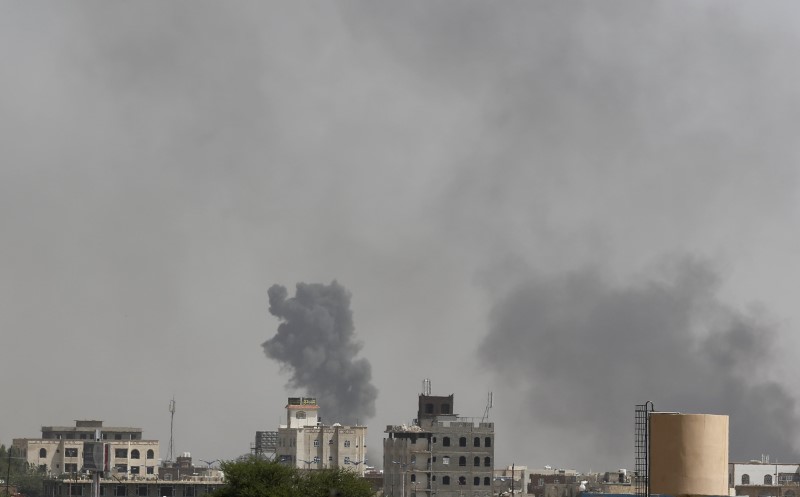By Mohammed Ghobari
SANAA (Reuters) - Jets belonging to a Saudi-led coalition killed at least 20 people at a wake in northern Yemen on Sunday, local tribesmen said, as warplanes pounded Houthis and other forces behind a missile strike that had killed dozens of Gulf Arab soldiers.
The air strikes targeted troops loyal to former president Ali Abdullah Saleh, an ally of the Houthis, across the country and hit a Houthi base in what had been the al-Imam University, a religious school in northern Sanaa, locals said.
But residents said the deadliest strike was in al-Jouf province north of Sanaa, where warplanes hit a wake for a local who had been killed by Houthi gunfire, in what was apparently an accidental strike by the coalition.
A spokesman for the coalition could not immediately be reached for a comment.
In Sanaa, residents said buildings had been levelled as explosions rang through the night and morning before stopping around noon. There were unconfirmed reports of two deaths.
The al-Sabeen maternity and children's hospital said it had been damaged, with patients trapped inside, and appealed to international organisations to help evacuate them.
The Saudi-led coalition says it does not target civilian facilities. But on Saturday, at least 27 members of two families were killed in Sanaa by air strikes targeting Houthi positions in the city, according to hospital officials.
DEADLY ATTACK
On Friday, the Iranian-allied Houthis had attacked a weapons storage facility in Marib, where supporters of exiled President Abd-Rabbu Mansour Hadi had been massing troops and equipment in preparation for an assault on Sanaa.
The attack killed 45 soldiers from the United Arab Emirates, 10 Saudis, five Bahrainis, and four Yemenis.
It was the heaviest toll suffered by the Saudi-led alliance since it began its air war in March to try to restore Hadi to power.
Hadi was installed in 2012 under a Gulf Arab-sponsored deal that saw Saleh, Yemen's leader of three decades, step down after months of street protests.
But after the Houthis seized the Yemeni capital last year, Hadi fled to the southern city of Aden, his main power base, and then into exile in Saudi Arabia.
UAE forces were important in helping Hadi's forces drive the Houthis and their allies back out of Aden in July, a big win for the Arab coalition.
But security has yet to be restored in the port city, where a spate of attacks and killings, as well as a demonstration by armed men waving al Qaeda flags, have prompted fears that Islamist militants could now take control.

Al Qaeda in the Arabian Peninsula (AQAP) denied in a Twitter (NYSE:TWTR) message that it was behind recent assassinations in the city, and laid the blame on pro-Saleh agents provocateurs, the SITE monitoring service reported.